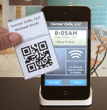How Two Brothers Started A $500K/Month Chain Of High-End Sneakers
Hello! Who are you and what business did you start?
My name is Andrew Pevzner, I and My brother Phillip Pevzner are the founders and owners of Laced Up. Laced Up are a chain of high-end collectible sneaker and streetwear resale stores. We carry brands like Supreme, Jordan, Yeezy, Bape, and more, all limited edition brands with the hype behind them. We currently have 4 retail stores in New York and New Jersey and do a good amount of business online through our website. We specialize in offering high-end collectible items in a convenient retail space with great customer service.

We have grown this business from a single store to 4 locations and over $5 Million annually in sales. We have had over 58,000 orders to customers all over the world. We have built a team of over 30 staff, providing new careers for many and financial security for us and our...

Download the report and join our email newsletter packed with business ideas and money-making opportunities, backed by real-life case studies.

Download the report and join our email newsletter packed with business ideas and money-making opportunities, backed by real-life case studies.

Download the report and join our email newsletter packed with business ideas and money-making opportunities, backed by real-life case studies.

Download the report and join our email newsletter packed with business ideas and money-making opportunities, backed by real-life case studies.

Download the report and join our email newsletter packed with business ideas and money-making opportunities, backed by real-life case studies.

Download the report and join our email newsletter packed with business ideas and money-making opportunities, backed by real-life case studies.

Download the report and join our email newsletter packed with business ideas and money-making opportunities, backed by real-life case studies.

Download the report and join our email newsletter packed with business ideas and money-making opportunities, backed by real-life case studies.

















